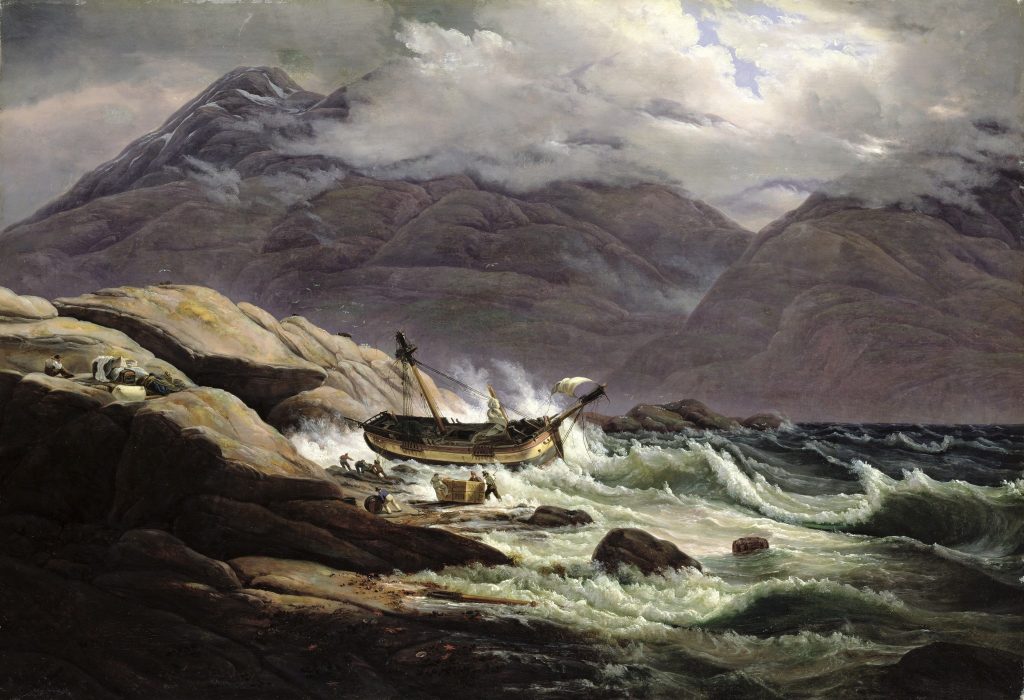Paul's journey to Rome in Acts 27 and 28 is applied to church history. Now there could be a whole debate about it with arguments for and against whether you can really apply it that way. We're not going to do that here.
Shipwreck
Still, I think there is reason to see the history of Acts 27 and 28 not only as history, but also to learn lessons from it for now. In doing so, we align with an earlier article from September 2017 (see here). In it we saw how Paul in the 1th letter to Timothy describes which dangers threaten the congregation of Jesus Christ and that those dangers show many characteristics of the 'contemplative way' (see here) that we know today. By not adhering to the "sound doctrine" of God's Word, Christians lose their faith. They are “shipwrecked in the faith” (1 Timothy 1:19)

Sound doctrine
This 'sound doctrine' also plays an important role in Paul's journey.
“(…) Paul warned them and said to them, “Men, I see that the voyage will be with hindrance and great damage, not only to the cargo and the ship, but also to our lives. But the centurion trusted the helmsman and the captain more than what was said by Paul.” (Acts 27:9-11)
This is what Paul says about the views of the helmsman and captain of the ship. These experts have 'learned more' to get a ship to its destination undamaged. It is humanly understandable that the centurion attaches more value to their advice than to Paul's words. Yet Paul was right and much disaster would have been avoided if they had listened to Paul.
We find the same in the Corinthians, where human wisdom (that is, foolishness in God's view) prevailed over the wisdom of God.
“(…) that your faith might not stand in the wisdom of men, but in the power of God. And we speak wisdom among the spiritually mature, but a wisdom not of this world, nor of the leaders of this world, who are brought to nothing. But we speak the wisdom of God as a mystery; a wisdom that was hidden, and which God predestined before all ages for our glory; a wisdom that none of the leaders of this world has known. (…)(1 Corinthians 2:5-8)
Like the Corinthians, we too must learn from Paul “(…) nothing to think of beyond what is written” (1 Corinthians 4:6). The practice, however, is that many consider what Paul teaches of less importance, or explain it in such a way that it is acceptable for our time.
So we are called to hold fast to 'sound doctrine', to what the apostles teach us in the New Testament. A community that does not stick to this 'sound doctrine' will perish through all kinds of difficulties, as the Corinthians also experienced. Just look at the problems in Corinth because they deviated from the teaching Paul had given them.
Euroclydon
When we read what happened to the ship on which Paul and his companions sailed, it almost reminds us of the Christendom in which we live. Where we see how the Christian communities no longer offer their 'passengers' the safety and security they need for safe navigation.

The cause of the shipwreck, as it is mentioned in Acts 27, is the Eastern storm Euroklydon[1]. This name contains a reference to Euros, the Greek god of the east wind. In any case, the storm made sure that the sailors could not keep the head of the ship in the wind and surrendered to the elements (Acts 27:15).
Can you see in this a picture of the downfall of Christianity? Of the apostasy going on from a mighty storm of idolatry that is sweeping Christendom and destroying the communities? I think so. It is a tremendous storm wind from which no community can escape and which destroys everything.
Hit on hit
While I'm working on this message, there is[2] published an article on CIP.nl that clearly shows how 'it works'. The title of the article is “Evangelical wave hits the BibleBelt: Traditional churches are going to take blow after blow.” A young man from the Reformed Church describes how he sees more and more young people leaving the Church for the evangelical communities. He also longs for something that he does not get in his own church. The article aptly describes the contrast between the two worlds, as for example in the following quotes.
“I longed more and more for experiencing and experiencing God. A rational experience of faith increasingly receded into the background and emotion came to the fore. I found myself placing less and less value on institutions and dogmatic truths. It's about what God does and how He works.”
“A beautiful sermon from the pastor, he thinks it's wonderful. Then I sometimes ask him if the words or songs in the service have touched him. He considers that of minor importance. A true reformed churchgoer is content to gather around the Word of God.”
“Preachers in our churches want to teach the congregation something about God, the Bible and backgrounds of what is written on Sunday. I see that my generation is especially looking for a minister who takes them into an experience with God. They want to be touched by the Holy Spirit.”
See how great the contrasts are. On the one hand, the Christians who are satisfied with the Word, are busy with it, want to learn from it. But on the other hand, the Christians who say goodbye to that, because it 'does nothing for them'. Those who want God experienced and look for it.
What a sad scene; on the one hand people with a Bible, but without apparently having a living relationship with the Lord Jesus. And on the other hand, people who let go of the Word of God and look for experiences, without realizing that they will fall into the snares of the devil and fall into idolatry. Two groups of Christians, but both without the saving faith in Christ the Crucified[3].
Food for Salvation
Back to Paul's boat trip. For days they try to survive together on the ship, run cables under it, make the ship lighter by throwing everything overboard, lowered the sail and let themselves float along. In such a situation you can no longer determine the direction yourself, you can no longer steer. So that you simply let yourself drift with what is happening.
Spiritually speaking, these are situations in which you come to the question of what your faith is really about; what is the core that you are left with, all 'ballast' is overboard and you have lost control in life.
At one point they hadn't eaten anything on the ship for 14 days and Paulus urged the people on board "take food, for it is for your salvation” (Acts 27:34).
If you use that expressionfood for salvation', then you must surely think of the Lord Jesus, Who could say of Himself that He 'the bread of life' is.
“Jesus said to them, 'I am the Bread of Life; whoever comes to Me will never be hungry, and whoever believes in Me will never be thirsty again. (…) Verily, verily, I say unto you, He that believeth in me hath everlasting life. I am the Bread of Life.” (John 6:35,47,48)
It is a remarkable chapter, where it becomes clear that many people sought the Lord Jesus because they were fed by Him (6:26); He had provided for their natural physical needs. But the Lord Jesus makes it clear that it is not about that and that it is only about whether you believe in Him. Then you will have eternal life (6:40,47). The Jews did not understand (6:52) and the Lord Jesus makes it clear that 'the bread' is not literal bread, but that being'flesh, which He will give for the life of the world' (6:51) and He makes it even more concrete when He speaks about His death on the cross, about His death: 'My flesh and My blood' (6:53-56).

He actually says 'if you believe in Me and know that My death was also necessary for your salvation, then you have eternal life'. But My death must also remain central in your life:
“Whoever eats My flesh and drinks My blood abides in Me, and I in him.”” (6:57)
You must continue to feed on Me, on My work, My surrender in death. You have to do this 'spiritual food and drink' every day to stay spiritually alive.
It means that Christ the Crucified must be the beginning of our Christian life and must remain for life. It's all about Him!
But for most of His disciples that was too much to ask. So many other things were important too, they thought. They found what Christ said to them a harsh word (6:60) and that is why many have withdrawn and no longer went with Him (6:66).
The Lord Jesus also asked the 12 disciples if they did not want to leave. He actually asked them if he was enough for them and Peter put it so beautifully when he said
“Lord, to whom shall we go? You have words of Eternal Life.
And we have believed and acknowledged that You are the Christ, the Son of the living God” (6:69)
We are approaching the end of Christianity
The sinking of the ship on which Paul sailed to Rome is in a sense an illustration of the times in which we live. The time when we are approaching the end of Christianity. Not only the Christian communities, but also the whole 'Christian culture'. Everything crumbles and falls apart.
In our time it is increasingly important, it is even vital, that every believer has a very personal living faith in which the love for the Lord Jesus Christ and the love for the Word of God are the most important 'pillars'. Only if that is present can you survive spiritually in our time of chaos and apostasy and be saved from being swept into the sinking of 'the Christian ship'.
We look forward to the coming of the Lord Jesus where we “be caught up in the clouds, to an encounter with the Lord in the air. So we will always be with the Lord.” (1 Thessalonicenzen 4:16,17)
[1] See, among other things, here: http://www.bijbelaantekeningen.nl/files/subject?978
[2] https://cip.nl/cip+/74677-menno-hanse-traditionele-kerken-gaan-klap-op-klap-krijgen/FRxVAABeAnwjbUkcEBoacxUZFw
[3] Of course, the reality is more nuanced. But I will start from what is written in the rather extensive article. This completely lacks the notion that the Christian faith is concerned with the Lord Jesus Christ who died for sinners on the cross of Golgotha.


